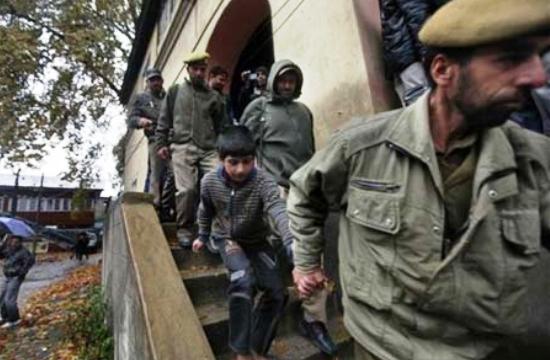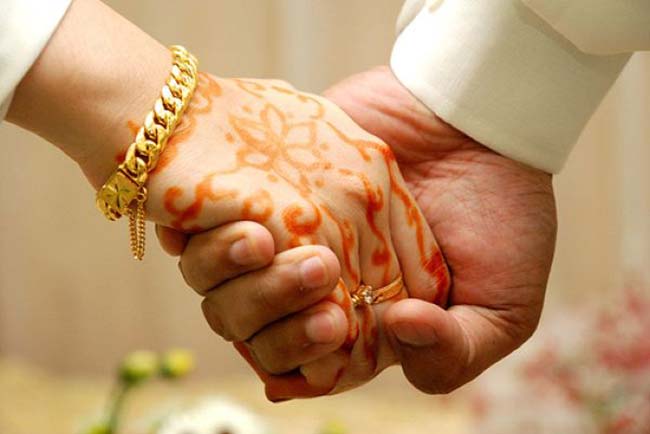As the crisis enters fourth month, arrests dominate the scene. Now cops move from door-to-door and get the ‘suspects’ to police station where they are served detention orders and quickly moved to the remotest jails within the state. Aakash Hassan gets stories of loss and the pain from the periphery of Kashmir

“Come along or wait to be dragged out,” were the two options cops gave to Bilal Sheikh, his wife Daizy Jan remembers. It was calm afternoon when a posse of cops barged into his Nandpora, Khanabal house at a time when Bilal was feeding his two years old son, who had underwent a minor surgery only few days back.
Daizy says the cops beat her when she came in between the cops and her husband. Dubbed “a great threat to the maintenance of peace and public order”, father of two infants and a cobbler by profession, Sheikh was slapped with draconian Public Safety Act and shifted to Kathua, after 10 days detention in the local police station. The dossier drafted by police accuses him of being “involved in abetting / inciting and instigating the youth,” and resorting to stone pelting incidents in the area that lead to “burning of CRPF vehicle and causing injuries to many cops.”
Daizy is perplexed. “The days our area witnessed protests and stone pelting incidents,” Daizy says, “We were stuck by our personal grief as our two-year-old kid was to be operated for the cyst on his head.” Her question is logical: How can a father go and throw stones when his son is on hospital bed?
Bilal was arrested and many days later, another cyst developed in the neck of his two year old son Aayan. When she took her to doctor, she was asked to get ready for another surgical intervention. A suckling mother, who is raising her six months old daughter too, Daizy is frustrated as Aayan faces serious pain in his neck.
“There is not a single day when I don’t cry. No one can imagine how hard it is to take care of two infants, one among whom is to be operated,” Daizy, 22, said, wiping her tears. “How can I suckle a baby while another need surgery and the only breadwinner is incarcerated hundreds of miles away.”
Under severe psychological stress, she says: “sometimes, I find suicide as only option left; but then there comes image of my kids.”

Raids and arrests are a routine and part of the ‘new normal’ Kashmir. The extent and the quantum of arrests are considered to be unprecedented, dwarfed in comparison to 1990 when the authorities had to create lot of space to hold people. There were places of detention which were later converted into jails like Papa-II, now the residence of Chief Minister Ms Mehbooba Mufti, or the Kot Bakwal jail in Jammu outskirts that is not a central jail.
Now J&K has 14 jails, nine in Jammu, one in Ladakh, and the balance four in Kashmir. By and large, the jails in J&K have remained ever-green, almost for 30 years now.
In November 2012, J&K was holding 2632 persons against the capacity of 2991. In October 2015, almost a year back, they had not much capacity. Against the overall capacity of detaining 3011 persons, 2406 berths were occupied. In fact, the Central Jail Srinagar was holding more people than its capacity.
The situation remained by and large unaltered in June 2016 when on June 19, the government informed the state legislature that it was holding 2344 people in jails – 1873 under trials, 354 convicts and 117 detainees. These included 90 prisoners under Public Safety Act which included six militants, 11 OWGs (over ground workers), six separatists, 7 stone pelters, 25 criminals and 35 drug peddlers.

This situation has helped various families to stay strong and face the situation. Accepting that their son was a regular stone thrower, in the past years, this Sarnal, Payeen family believes that ‘only past records’ led cops arrest their son. Mudasir Ahmad Bangi, 30, was a regular Sang Bazz in police books and was detained earlier, in 2010 and before that for “mobilizing youth”. His elder brother Imtiyaz Ahmad, who works as a shopkeeper was hit by pellets in left eye, in June 2016 after a Friday processing from Jamia Masjid Islamabad was intersected by forces resulting in clashes.
Since then, Bangis say, their son was not involved in any activity but busy with his pellet hit brother in different hospitals in the state and outside. He was however arrested on August 10, from his home at noon, on the pretext that he will be released in a couple of days.
“We thought, they (police) might have to inquire something from him given his earlier involvement,” his father Ghulam Hassan Bangi said. “We didn’t panic because we knew, our son had not absconded but he did not return home.”
Mudasir was slapped with PSA. His dossier refers to “chronic stone pelter’s” four FIR’s registered in 2011 and 2015, all sub-judice. This time he has been named in seven FIRS’ over “unabated stone pelting” and accused of “inciting the youth who have caused damage to the Government property.” The “threat to the maintenance of peace and public order” is now resting in Kathua jail.
Ghulam Hassan asks questions but nobody has answer: “One son is blinded, another is in jail. Instead of helping me, I have to take care of them!”
“In terms f section 8 of the J&K public Safety Act, 1978, the Government has the power to pass detention orders on the grounds of security of the state, maintenance of public order, smuggling of timber or in respect of foreigners to regulate their continued presence in the state, as the case may be,. Under sub clauses (i) and (ii) of clause (a) or (a-1) of sub section (1) of section 8 of the Act, Divisional Commissioners or the District Magistrate can also pass the detention orders.
The ongoing arrest spree has an unprecedented modus opernadi. Last week, army marched out of the garrisons in Baramulla and the old town was taken into custody. For the whole day, the soldiers scanned the residences of more than 700 families, arrested 44 “suspects” besides recovering Chinese and Pakistani national flags. “It was like the earlier crackdowns when soldiers would order residents out of their homes and then get hooded spotter to take the suspects,” Abdul Aziz, an old town resident said. “It was shocking that the security grid termed the arrested youth were related to terror activities while the fact is they were part of the civil unrest.”
Damaging of the property, mostly electronics and glass-ware, and marshalling the inmates by the raiding cops, is new-normal. When cops raided Kulgam village for arrests they not only broke window panes of half of the village and dragged the Namazis, but left only after allegedly setting ablaze two houses and raw paddy heaps. Hundreds of youth are absconding to evade arrests and back home their families have to face the police wrath.
As cops were unable to find Mir Hafizulla, Tehreek-e- Hurriyat’s Islamabad district head, he was declared ‘proclaimed offender’, a reward was announced on his head, and eventually they arrested his brother in lieu of him.
Mrs Hafizullah said she left the house with four minor children to stay with relatives after forces continuously raided and vandalized the property. “Doors were plucked out and window broken. My children are harassed for none of their fault,” she says.
There are no exclusions when it comes to arrests. The school records of the Tanveer Ahmad Bhat show his age as 17 but still he was slapped with PSA as the dossier believes him to be 21. The middle pass Bhat was learning driving, his family says. On August 16, police arrested him near Mattan on KP road. Apart from being accused of stone pelting, the dossier mentions that he has lead a mob “that ransacked the house” of Omkarnath at Batipora. However, the family says that no such house was ransacked in Batipora. “I don’t know that where from this house came and who ransacked it. It might have suffered some damage when Pandits left the valley but no one in that area witnessed such sort of incident then where from police saw my son,” his father Manzoor Ahmad Bhat said.
Sameera Jan, Tanveer’s elder sister says that, “I am three years older than my brother and yet to turn 21.”
Before moving him to Kot Balwal, he was interrogated at JIC Khanabal for nearly a week, the family alleged. “When we went to meet him, he could barely stand properly and, since then, I have turned heart patient as my BP is always high,” Nigeena, his mother, said. “He was the youngest face there.”
The family wishes to see him in Kot Balwal but insist they lack money to meet even their daily needs. “Our first visit has taken all our savings, but I can’t stop, I will sell something but visit again; my heart can’t bear more,” Nigeena says, while kissing Tanveer’s photograph. Deputy Commissioner Islamabad has told the family to show the original date of birth certificate so that, PSA order would be quashed. For the last 10 days, the family is unable to secure the certificate because schools are closed!
“We will quash the order once they produce original DOB from the school,” said Sayeed Abid Rashid, Deputy Commissioner Islamabad, adding that one such case has already been done. PSA of Firdous Ahmad Bhat, from Jablipora was quashed after he was found to be only 17.

Minors apart, even aged and ailing have gone to jail for “disrupting peace”. In Bandipora’s Hajin area father and son were arrested under PSA. Ali Mohammad Dar, 75, was arrested while coming out of mosque. A fortnight later, his son Showkat was also arrested. The family without lacks a male member.
“He has three minor kids, elder one is 5-years-old and they weep all day,” says Showkat’s mother. “They were participating in the rallies as everyone else and but how can they book both father and son under PSA.”
Interestingly, the family lacks access to the dossiers. “We don’t know if we can really meet them? Who will take us to Kotbalwal?” the aged woman said.
Initially there were no arrests at all. The reason: police at ground zero was busy managing the situation. Then they were served with long lists by their high-ups and a new routine started. Managing the protests during the day and raiding the accused during the nights.
Admitting that they got a list of suspects from the top, a district police head told Kashmir Life that “those were the people indexed by the police in 2008 and 2010 unrests.” Interestingly, this list included some names who were already consumed by the earlier unrests. There were reports that these lists were drafted by the political activists.
“This is not a fact that we were asked to arrest the people listed by the PHQ,” the officer said, “We were asked to cross-check if any of them was involved and once we started working on it, we found some involved and some sitting on the fences. In most of the cases, we found new characters on the scene.”
“New characters”, the officer said, were young men who lack any past history. “Once we arrest them, we correlate the charges on basis of the solid evidences that we have – video footage,” the officer said. Police purchased scores of video-cameras within days after the unrest started. The officer said the motion picture records help them exactly to categorize the accused. “Body language helps us understand if the accused was a leader or a follower, an active or a passive participant,” the officer said. He said the arrests followed only once there was some relief on the streets. “We were recording things and dumping it because we had no time to watch it and now we see records on basis of the seriousness of the incidents.”
The officer said a section of the accused is set free on the guarantee of the parents and the community. He said he set free two engineering students and excluded them in an FIR because it could have ruined their career. “The more serious accused for us are the people who organized the crisis and instigated it,” the officer said.
“Detention orders are generally passed by the District Magistrate (s) on consideration of the dossier prepared by the concerned SSP or SP. The District Magistrate concerned after applying his mind to the facts and circumstances of the case and satisfying himself about the adequacy of the material placed before him and also keeping in view the activities of the subject, passes an order under section (8)(1)(a)(i) or (a-1) of the Act. The order is to be approved by the government within twelve (12) days in terms of sub section (4) of section (8) of the Act. If approved, the case is then to be forwarded to the state advisory board constituted for the purpose for its opinion.
The officer said those booked under PSA are “repeated”, instigators and Hurriyat affiliates. He said the Deputy Commissioner is actually going into the dossiers because they are much closer to the society than the police. “My DC turned down almost 18 dossiers for one or the other reason,” the officer said, “In a few cases, we were asked to screen the footage to doubly ensure that we had not implicated a person.” In one case, a boy who was accused in 2008, 2009, and 2010 but was saved simply because DC said he was a minor.
In a south Kashmir district, a DC rejected a bulk of cases insisting that the law wants him to “apply his mind”. He has refused signing the cases in which the minors were mentioned as majors.
But the textbook things do not happen everywhere. There are instances in which people have allegedly paid to stay away from the harm. Even politics has played a role. “We have landed in a situation that people are paying for not getting arrested,” one middle-rung police officer said. “The fact is that the rates for ransom have gone up, this season.”
It also seems that cops have learned to put the “wanted stone pelters” under net after taking inspiration from Hollywood crime thrillers as the classic ways to nab them are turning futile. To arrest Sarfaraz of Nawhatta, eyewitnesses say, that it looked like some furious encounter has broken out after a number of forces vehicles cracked down in Nawshara to ‘hunt the headache’— solo wanted. But ‘fortified forces cordon’ doesn’t work always. After umpteen number of futile attempts to nab a Batamaloo ‘wanted’, cops came up with a new trap that was , however successful. Busy in playing cricket, he realized very late that the five players who hugged him were not the cricketers actually but the cops who were running after him for long time.

Information available with Kashmir Life suggests that police have so far registered 2258 cases across Kashmir. The number of arrests and the people involved has to somehow match the cases registered. Sopore is one of the smallest police districts. Sensitive though, it has five police station and 36 spots where the army and paramilitary forces exist and operate from. It has registered the highest number of cases: 432.
“A case is an incident and we have not left any incident that was not formally recorded,” one police official from the district said, insisting that instances in which police used any weapon – from bamboo to pellet, are cases that merit an FIR. “We have identified the accused in all these incidents and arrests are going on.”
“Section 10 of the J&K Public Safety Act, 1978 confers powers on the government to regulate place and conditions of detention. Clause (a) of section 10 provides that any person in respect of whom a detention order has been made under section 8 shall be liable to be detained in such place and under such conditions including conditions as to the maintenance of discipline and punishment for breaches of discipline as the government may, be general or special order, specify. While deciding on the lodgment of the detainee various factors are taken into consideration by the detaining authority, which include history of the detinue detainee, activities involved in and the ground (s) of detention. In terms of clause (b) of section 10, a person detained can be removed / shifted from one place of detention to another place of detention by order of the government.”
If one instance makes one case, then south Kashmir districts of Islamabad and Kulgam – where most of the casualties took place – were almost peaceful! Islamabad has registered 247 cases and Kulgam 142. Only an investigation can offer a benchmark co-relation between numbers of reported instances, cases registered, people involved, deaths that took place, the injured and the use of force. Right now, the situation is that police believes there are not more than 6000 people involved in overall disturbances, but they have already arrested more than 4500 people formally. If informal detentions are taken into account, they have already crossed 10,000.
Between the arrest and the eventual release, lot many things happen and the script can go wrong. Majid (not his real name)Sayed Sultan, 14, is a north Kashmir resident, who was arrested by police on “false charges”. Set free after 22 days of “abuse and torture”, he has his leg still seriously injured.
“They used derogatory language against my mother and sisters despite the fact that I was never involved in stone pelting,” MajidSultan said. “Their deeds have turned me from English novels to the street protests and why should anybody bear the abuses for no fault.”















